大学英语作文之大城市生活的利与弊
- 格式:doc
- 大小:24.00 KB
- 文档页数:1
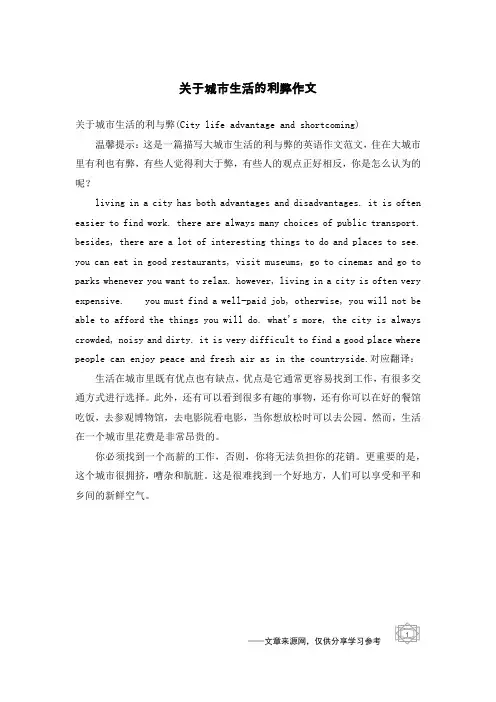
——文章来源网,仅供分享学习参考1 关于城市生活的利弊作文关于城市生活的利与弊(City life advantage and shortcoming)温馨提示:这是一篇描写大城市生活的利与弊的英语作文范文,住在大城市里有利也有弊,有些人觉得利大于弊,有些人的观点正好相反,你是怎么认为的呢?living in a city has both advantages and disadvantages. it is often easier to find work. there are always many choices of public transport. besides, there are a lot of interesting things to do and places to see. you can eat in good restaurants, visit museums, go to cinemas and go to parks whenever you want to relax. however, living in a city is often very expensive. you must find a well-paid job, otherwise, you will not be able to afford the things you will do. what's more, the city is always crowded, noisy and dirty. it is very difficult to find a good place where people can enjoy peace and fresh air as in the countryside.对应翻译: 生活在城市里既有优点也有缺点,优点是它通常更容易找到工作,有很多交通方式进行选择。
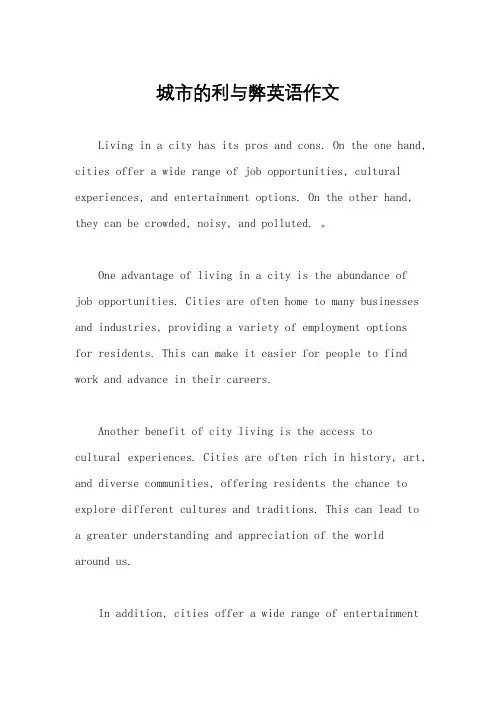
城市的利与弊英语作文Living in a city has its pros and cons. On the one hand, cities offer a wide range of job opportunities, cultural experiences, and entertainment options. On the other hand, they can be crowded, noisy, and polluted. 。
One advantage of living in a city is the abundance ofjob opportunities. Cities are often home to many businesses and industries, providing a variety of employment optionsfor residents. This can make it easier for people to find work and advance in their careers.Another benefit of city living is the access tocultural experiences. Cities are often rich in history, art, and diverse communities, offering residents the chance to explore different cultures and traditions. This can lead to a greater understanding and appreciation of the worldaround us.In addition, cities offer a wide range of entertainmentoptions. From restaurants and bars to theaters and music venues, there is always something to do in the city. This can make city living exciting and dynamic, with endless opportunities for fun and adventure.However, living in a city also has its drawbacks. One major downside is the overcrowding and congestion. Cities can be crowded with people and traffic, leading to long commutes and crowded public spaces. This can make it difficult to find peace and quiet in the city.Furthermore, cities are often noisy and polluted. The constant hum of traffic and construction can be overwhelming, and the air quality in cities is often poor due to pollution. This can have negative effects on residents' physical and mental health.In conclusion, living in a city has its advantages and disadvantages. While cities offer job opportunities, cultural experiences, and entertainment options, they can also be crowded, noisy, and polluted. It's important forindividuals to weigh these factors and decide what is best for their own lifestyle and well-being.。
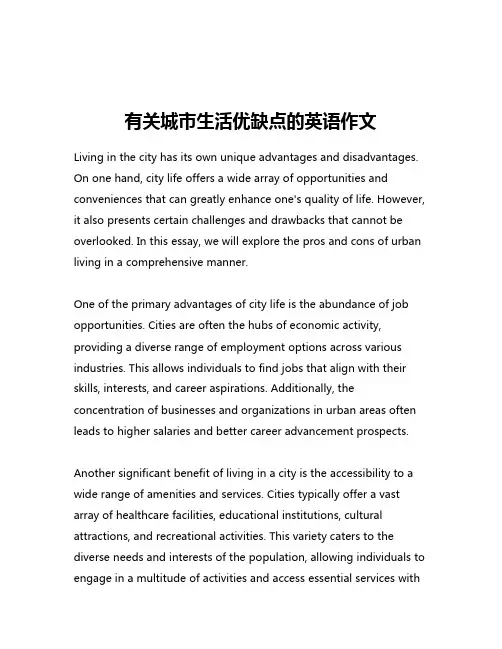
有关城市生活优缺点的英语作文Living in the city has its own unique advantages and disadvantages. On one hand, city life offers a wide array of opportunities and conveniences that can greatly enhance one's quality of life. However, it also presents certain challenges and drawbacks that cannot be overlooked. In this essay, we will explore the pros and cons of urban living in a comprehensive manner.One of the primary advantages of city life is the abundance of job opportunities. Cities are often the hubs of economic activity, providing a diverse range of employment options across various industries. This allows individuals to find jobs that align with their skills, interests, and career aspirations. Additionally, the concentration of businesses and organizations in urban areas often leads to higher salaries and better career advancement prospects.Another significant benefit of living in a city is the accessibility to a wide range of amenities and services. Cities typically offer a vast array of healthcare facilities, educational institutions, cultural attractions, and recreational activities. This variety caters to the diverse needs and interests of the population, allowing individuals to engage in a multitude of activities and access essential services withrelative ease. The availability of public transportation systems, such as buses, trains, and subways, further enhances the convenience of city living by providing efficient means of commuting and exploring the urban landscape.Furthermore, city life often fosters a sense of community and cultural diversity. Urban areas are home to people from various backgrounds, ethnicities, and socioeconomic statuses, which can lead to a rich exchange of ideas, traditions, and perspectives. This diversity can expose individuals to new experiences, broaden their horizons, and foster a greater understanding and appreciation of different cultures. Additionally, cities often host a vibrant arts and entertainment scene, offering opportunities to attend concerts, theater performances, art exhibitions, and other cultural events.However, the advantages of city life are not without their drawbacks. One of the most significant challenges is the high cost of living. Housing prices, rent, and the overall cost of goods and services are typically much higher in urban areas compared to suburban or rural regions. This can create financial strain for individuals and families, particularly those with limited incomes, and may limit their ability to afford a comfortable standard of living.Another significant downside of city life is the issue of overcrowding and congestion. The high population density in cities can lead totraffic jams, overcrowded public transportation, and a general sense of crowdedness and lack of personal space. This can result in increased stress levels, longer commute times, and a diminished sense of privacy and personal freedom.Moreover, the fast-paced and often hectic nature of city life can take a toll on one's mental and physical well-being. The constant noise, pollution, and hustle and bustle can contribute to feelings of anxiety, depression, and burnout. Additionally, the lack of access to green spaces and natural environments in urban areas can negatively impact an individual's overall well-being and connection with nature.Furthermore, the high population density in cities can also lead to challenges in terms of resource allocation and environmental sustainability. The demand for housing, transportation, and other infrastructure can put a strain on the city's resources and contribute to environmental degradation, such as air and water pollution, waste management issues, and the depletion of natural resources.In conclusion, the decision to live in a city involves carefully weighing the advantages and disadvantages. While city life offers a wealth of opportunities, conveniences, and cultural experiences, it also presents significant challenges in terms of cost of living, overcrowding, and the potential impact on mental and physical well-being. Ultimately, the choice to reside in an urban area will dependon an individual's personal preferences, priorities, and the ability to navigate the complexities of city living. Regardless of the decision, it is crucial to be aware of the trade-offs and take proactive steps to address the potential drawbacks of urban living.。
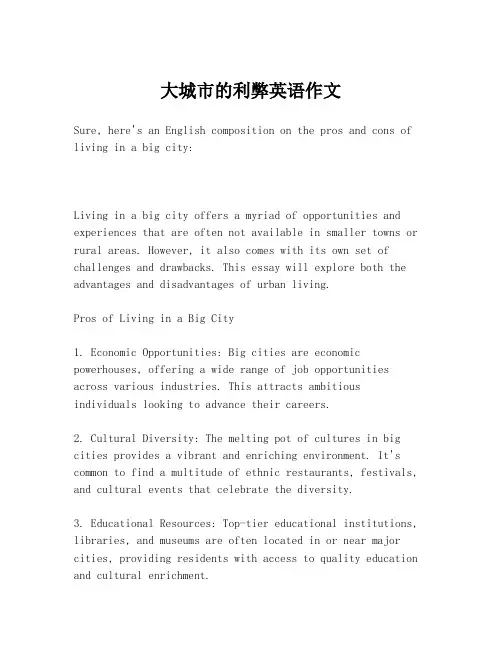
大城市的利弊英语作文Sure, here's an English composition on the pros and cons of living in a big city:Living in a big city offers a myriad of opportunities and experiences that are often not available in smaller towns or rural areas. However, it also comes with its own set of challenges and drawbacks. This essay will explore both the advantages and disadvantages of urban living.Pros of Living in a Big City1. Economic Opportunities: Big cities are economic powerhouses, offering a wide range of job opportunities across various industries. This attracts ambitious individuals looking to advance their careers.2. Cultural Diversity: The melting pot of cultures in big cities provides a vibrant and enriching environment. It's common to find a multitude of ethnic restaurants, festivals, and cultural events that celebrate the diversity.3. Educational Resources: Top-tier educational institutions, libraries, and museums are often located in or near major cities, providing residents with access to quality education and cultural enrichment.4. Entertainment and Recreation: From world-class theaters to sports arenas, big cities offer an array of entertainment options. There's always something happening, whether it's a concert, a sports game, or a new exhibition.5. Public Transportation: Well-developed publictransportation systems in big cities make it easier to commute without the need for a personal vehicle.Cons of Living in a Big City1. Cost of Living: The high cost of living is one of the most significant drawbacks of city life. Housing, food, and transportation can be significantly more expensive than in smaller towns.2. Crowded Spaces: With a large population comes congestion. Traffic jams, crowded public transport, and busy sidewalks are common occurrences that can lead to stress and a lower quality of life.3. Pollution: Big cities often suffer from air and noise pollution due to the high volume of traffic and industrial activities.4. Lack of Personal Space: In a densely populated area, it can be challenging to find solitude or quiet spaces, which can be essential for mental well-being.5. Social Isolation: Despite the large population, big citiescan sometimes lead to feelings of loneliness and isolationdue to the fast-paced lifestyle and the transient nature of urban living.In conclusion, while big cities offer numerous benefits suchas job opportunities, cultural experiences, and entertainment, they also present challenges like high living costs,pollution, and social isolation. The decision to live in abig city should be weighed carefully, considering both the advantages and disadvantages.This composition provides a balanced view of the topic, highlighting both the positive aspects and the potential downsides of living in a large urban area.。
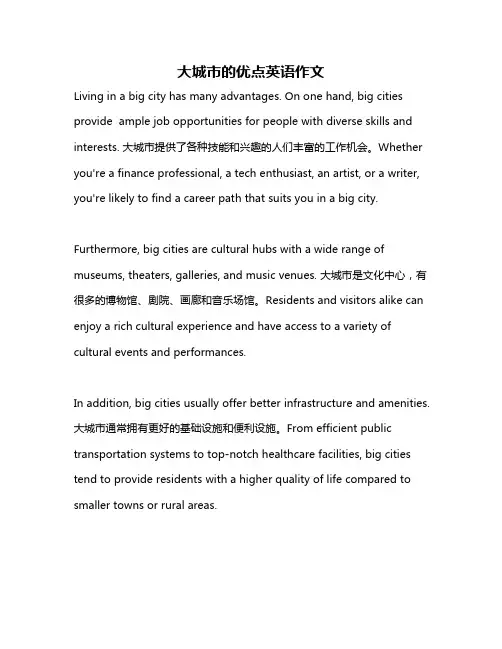
大城市的优点英语作文Living in a big city has many advantages. On one hand, big cities provide ample job opportunities for people with diverse skills and interests. 大城市提供了各种技能和兴趣的人们丰富的工作机会。
Whether you're a finance professional, a tech enthusiast, an artist, or a writer, you're likely to find a career path that suits you in a big city.Furthermore, big cities are cultural hubs with a wide range of museums, theaters, galleries, and music venues. 大城市是文化中心,有很多的博物馆、剧院、画廊和音乐场馆。
Residents and visitors alike can enjoy a rich cultural experience and have access to a variety of cultural events and performances.In addition, big cities usually offer better infrastructure and amenities. 大城市通常拥有更好的基础设施和便利设施。
From efficient public transportation systems to top-notch healthcare facilities, big cities tend to provide residents with a higher quality of life compared to smaller towns or rural areas.Moreover, big cities are melting pots of diversity and multiculturalism. 大城市是多样性和多文化融合的交汇处。
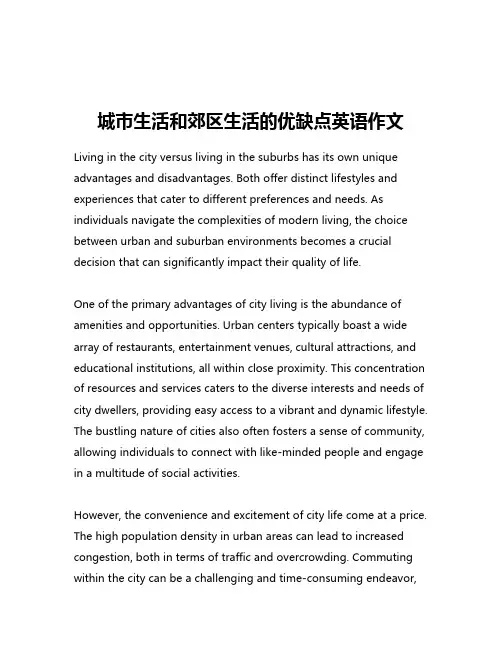
城市生活和郊区生活的优缺点英语作文Living in the city versus living in the suburbs has its own unique advantages and disadvantages. Both offer distinct lifestyles and experiences that cater to different preferences and needs. As individuals navigate the complexities of modern living, the choice between urban and suburban environments becomes a crucial decision that can significantly impact their quality of life.One of the primary advantages of city living is the abundance of amenities and opportunities. Urban centers typically boast a wide array of restaurants, entertainment venues, cultural attractions, and educational institutions, all within close proximity. This concentration of resources and services caters to the diverse interests and needs of city dwellers, providing easy access to a vibrant and dynamic lifestyle. The bustling nature of cities also often fosters a sense of community, allowing individuals to connect with like-minded people and engage in a multitude of social activities.However, the convenience and excitement of city life come at a price. The high population density in urban areas can lead to increased congestion, both in terms of traffic and overcrowding. Commuting within the city can be a challenging and time-consuming endeavor,with residents often facing lengthy commute times and the stress of navigating through congested roads or public transportation systems. Additionally, the cost of living in cities is typically higher, with housing, utilities, and other essential expenses often exceeding those in suburban or rural areas.In contrast, suburban living offers a more serene and spacious environment. The lower population density in the suburbs often translates to a quieter and more peaceful atmosphere, where residents can enjoy a greater sense of personal space and privacy. Suburban neighborhoods are frequently characterized by larger living spaces, both in terms of residential properties and outdoor areas, providing families and individuals with the opportunity to enjoy more expansive living conditions.One of the primary advantages of suburban living is the availability of more affordable housing options. The lower cost of land and construction in suburban areas often results in more affordable homes, making it easier for individuals and families to purchase or rent property. This can be particularly appealing for those seeking to achieve a higher quality of life within their financial means.However, the tranquility and affordability of suburban living come with their own drawbacks. The distance from the urban core can lead to a more limited access to certain amenities and services, such asspecialized healthcare facilities, high-end entertainment options, and diverse cultural offerings. Residents of the suburbs may need to commute longer distances to reach their workplaces or to access these resources, leading to increased transportation costs and time spent on the road.Moreover, the reliance on personal vehicles in suburban areas can contribute to a higher carbon footprint and environmental impact. The dispersed nature of suburban development often necessitates the use of cars for daily activities, which can result in a greater dependency on fossil fuels and a less sustainable lifestyle.Ultimately, the choice between city living and suburban living is a highly personal one, influenced by individual preferences, lifestyle needs, and financial considerations. Both environments offer unique advantages and disadvantages, and individuals must carefully weigh the tradeoffs to determine the option that best aligns with their aspirations and priorities. Whether one chooses the vibrant and dynamic city or the tranquil and spacious suburbs, the decision can have a profound impact on their overall quality of life and well-being.。
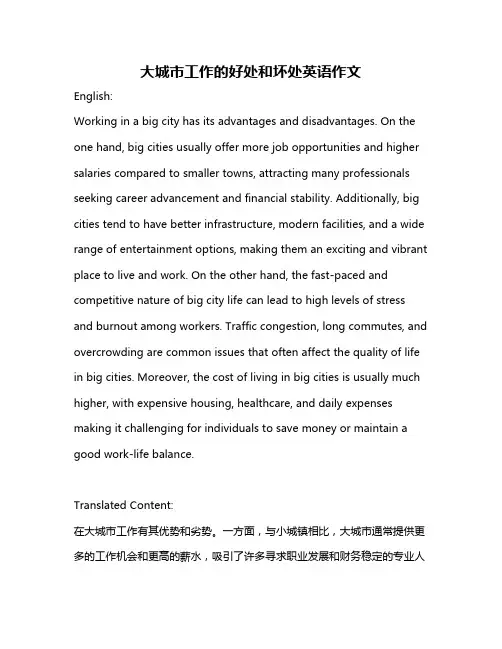
大城市工作的好处和坏处英语作文English:Working in a big city has its advantages and disadvantages. On the one hand, big cities usually offer more job opportunities and higher salaries compared to smaller towns, attracting many professionals seeking career advancement and financial stability. Additionally, big cities tend to have better infrastructure, modern facilities, and a wide range of entertainment options, making them an exciting and vibrant place to live and work. On the other hand, the fast-paced and competitive nature of big city life can lead to high levels of stress and burnout among workers. Traffic congestion, long commutes, and overcrowding are common issues that often affect the quality of life in big cities. Moreover, the cost of living in big cities is usually much higher, with expensive housing, healthcare, and daily expenses making it challenging for individuals to save money or maintain a good work-life balance.Translated Content:在大城市工作有其优势和劣势。
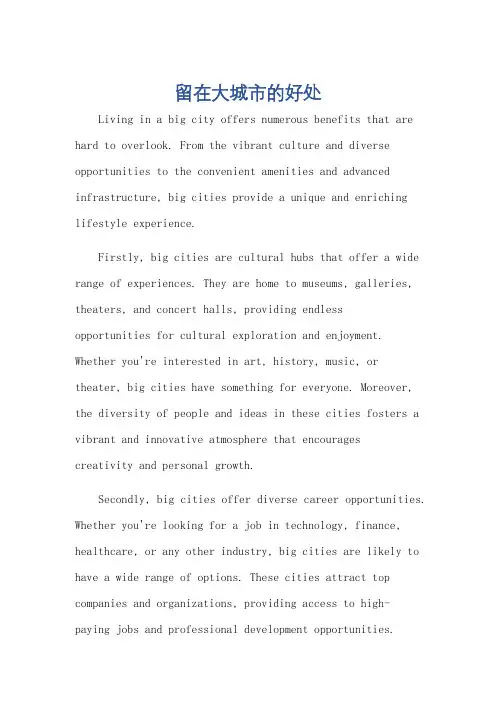
留在大城市的好处Living in a big city offers numerous benefits that are hard to overlook. From the vibrant culture and diverse opportunities to the convenient amenities and advanced infrastructure, big cities provide a unique and enriching lifestyle experience.Firstly, big cities are cultural hubs that offer a wide range of experiences. They are home to museums, galleries, theaters, and concert halls, providing endlessopportunities for cultural exploration and enjoyment. Whether you're interested in art, history, music, or theater, big cities have something for everyone. Moreover, the diversity of people and ideas in these cities fosters a vibrant and innovative atmosphere that encouragescreativity and personal growth.Secondly, big cities offer diverse career opportunities. Whether you're looking for a job in technology, finance, healthcare, or any other industry, big cities are likely to have a wide range of options. These cities attract top companies and organizations, providing access to high-paying jobs and professional development opportunities.Additionally, the networking and connections you can make in big cities can be invaluable for career advancement.Thirdly, big cities provide convenient amenities and services. From shopping centers and restaurants to public transportation and healthcare facilities, big cities offer everything you need to live a comfortable and convenient life. The availability of these amenities makes it easier to get around, save time, and enjoy life's pleasures.Moreover, big cities are often at the forefront of technological advancements and innovation. They are the first to adopt new technologies and implement innovative ideas, providing residents with access to cutting-edge technology and a modern lifestyle.Lastly, living in a big city can be exciting and dynamic. Big cities are constantly evolving and changing, with new events, festivals, and attractions happening regularly. This constant buzz and activity can be exciting and invigorating, making life in a big city never boring. However, it's important to note that living in a big city also has its challenges, such as high living costs, competition, and a fast-paced lifestyle. But for manypeople, the benefits outweigh these challenges, making big cities the ideal place to live and work.In conclusion, living in a big city offers a unique and enriching experience that is hard to replicate in smaller towns or rural areas. From cultural experiences, career opportunities, convenient amenities, technological advancements, to the excitement and dynamism of city life, big cities provide a lifestyle that is rich, diverse, and fulfilling.**留在大城市的好处**留在大城市生活有着诸多难以忽视的好处。
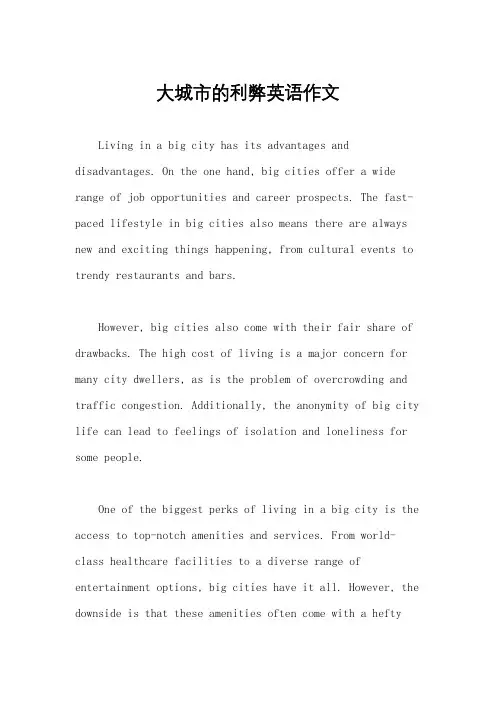
大城市的利弊英语作文Living in a big city has its advantages and disadvantages. On the one hand, big cities offer a wide range of job opportunities and career prospects. The fast-paced lifestyle in big cities also means there are always new and exciting things happening, from cultural events to trendy restaurants and bars.However, big cities also come with their fair share of drawbacks. The high cost of living is a major concern for many city dwellers, as is the problem of overcrowding and traffic congestion. Additionally, the anonymity of big city life can lead to feelings of isolation and loneliness for some people.One of the biggest perks of living in a big city is the access to top-notch amenities and services. From world-class healthcare facilities to a diverse range of entertainment options, big cities have it all. However, the downside is that these amenities often come with a heftyprice tag, making them inaccessible to many residents.Another advantage of big city living is the cultural diversity and the opportunity to meet people from all walks of life. This can lead to a greater understanding and appreciation of different cultures and perspectives. On the flip side, the sheer size and diversity of big cities can also lead to social fragmentation and a lack of community spirit.In conclusion, living in a big city has its pros and cons. While the abundance of opportunities and amenities can be enticing, the high cost of living and potential for social isolation are important factors to consider. Ultimately, whether big city living is right for you will depend on your individual preferences and priorities.。
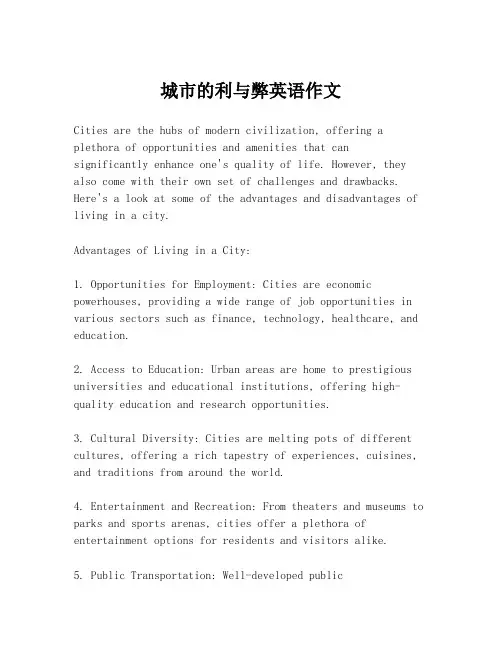
城市的利与弊英语作文Cities are the hubs of modern civilization, offering a plethora of opportunities and amenities that cansignificantly enhance one's quality of life. However, they also come with their own set of challenges and drawbacks. Here's a look at some of the advantages and disadvantages of living in a city.Advantages of Living in a City:1. Opportunities for Employment: Cities are economic powerhouses, providing a wide range of job opportunities in various sectors such as finance, technology, healthcare, and education.2. Access to Education: Urban areas are home to prestigious universities and educational institutions, offering high-quality education and research opportunities.3. Cultural Diversity: Cities are melting pots of different cultures, offering a rich tapestry of experiences, cuisines, and traditions from around the world.4. Entertainment and Recreation: From theaters and museums to parks and sports arenas, cities offer a plethora of entertainment options for residents and visitors alike.5. Public Transportation: Well-developed publictransportation systems make it easier to commute and travel within and between cities.Disadvantages of Living in a City:1. Cost of Living: The cost of living in cities is generally higher than in rural areas, with housing, food, and services often being more expensive.2. Traffic and Congestion: Cities are notorious for traffic jams and crowded streets, which can lead to increased stress and reduced quality of life.3. Pollution: High levels of air and noise pollution are common in urban areas, posing health risks to residents.4. Lack of Green Spaces: With limited land, cities often struggle to provide ample green spaces and parks, which are essential for mental and physical well-being.5. Social Isolation: Despite the high population density, cities can sometimes lead to feelings of isolation and loneliness due to the fast-paced and impersonal nature of urban life.In conclusion, while cities offer numerous benefits such as job opportunities, cultural experiences, and entertainment, they also present challenges like high living costs, pollution, and congestion. Balancing the pros and cons is essential for individuals deciding whether city life is the right choice for them.。

城市生活英语作文(精彩7篇)(经典版)编制人:__________________审核人:__________________审批人:__________________编制单位:__________________编制时间:____年____月____日序言下载提示:该文档是本店铺精心编制而成的,希望大家下载后,能够帮助大家解决实际问题。
文档下载后可定制修改,请根据实际需要进行调整和使用,谢谢!并且,本店铺为大家提供各种类型的经典范文,如计划报告、合同协议、心得体会、演讲致辞、条据文书、策划方案、规章制度、教学资料、作文大全、其他范文等等,想了解不同范文格式和写法,敬请关注!Download tips: This document is carefully compiled by this editor. I hope that after you download it, it can help you solve practical problems. The document can be customized and modified after downloading, please adjust and use it according to actual needs, thank you!Moreover, our store provides various types of classic sample essays, such as plan reports, contract agreements, insights, speeches, policy documents, planning plans, rules and regulations, teaching materials, complete essays, and other sample essays. If you would like to learn about different sample formats and writing methods, please stay tuned!城市生活英语作文(精彩7篇)城市生活的利与弊高考英语的满分作文篇一城市生活的利与弊高考英语的满分作文Living in a city has both advantages and disadvantages.It is often easier to find work.There are always many choices of public transport.Besides,there are a lot of interesting things to do and places to see.You can eat in good restaurants,visit museums, go to cinemas and go to parks whenever you want to relaX.However, living in a city is often very eXpensive.You must find a well-paid job, otherwise, you will not be able to afford the things you will do.Whats more, the city is always crowded, noisy and dirty.It is very difficult to find a good place where people can enjoy peace and fresh air as in the countryside.城市生活作文篇二城市生活当城里人刚刚起床时,听到的不是清脆悦耳的鸡鸣声,而是汽车飞驰过地面的“嚓嚓”声和清洁工人的脚步声,往窗口望去,高高低低的楼房仿佛一块块五彩斑斓的宝石镶嵌在一条条长而宽的马路之间,汽车的汽笛声,汽车排出尾气时的噪音和公交车到站的预告形成了一个嘈杂的环境。
城市生活的利与弊
按照下面提示,写一篇词数为100左右的关于都市生活的利和弊的文章.
advantage.disadvantage.
找工作容.生活消费.
交通便.人口多,拥.
有公园、饭店等休闲场.空气污染、居住环境.
要求:
1.覆盖以上内容,可作适当发挥。
2.词数100左右.
都市生活的利与弊(advantag.an.disadvantage.o.livin.i.th.city)
livin.i..cit.ha.bot.advantage.an.disadvantages.i.i.ofte.easie.t.fin.work.th er.ar.alway.man.choice.o.publi.transport.besides.ther.ar..lo.o.interestin.thing.t.d.a n.place.t.see.yo.ca.ea.i.goo.restaurants.visi.museums.g.t.cinema.an.g.t.park.when eve.yo.wan.t.relax.however.livin.i..cit.i.ofte.ver.expensive.yo.mus.fin..well-pai.j ob.otherwise.yo.wil.no.b.abl.t.affor.th.thing.yo.wil.do.what’.more.th.cit.i.alway. crowded.nois.an.dirty.i.i.ver.difficul.t.fin..goo.plac.wher.peopl.ca.enjo.peac.an.fr es.ai.a.i.th.countryside.。
[英语作文]living in a big city英语作文(精选6篇)living in a big city英语作文(精选6篇)Living in a city has both advantages and disadvantages. It is often easier to find work. There are always many choices of public transport. Besides, there are a lot of interesting things to do and places to see. You can eat in good restaurants, visit museums, go to cinemas and go to parks whenever you want to relax. However, living in a city is often very expensive. You mustfind a well-paid job, otherwise, you will not be able to afford the things you will do. Whats more, the city is always crowded, noisy and dirty. It is very difficult to find a good place where people can enjoy peace and fresh air asin the countryside.生活在一个城市都有各自的优势和劣势。
通常更容易找到工作。
总是有许多的选择公共交通工具。
除此之外,有很多有趣的事情和地方。
你可以吃的好餐馆,参观博物馆,去电影院,去公园当你想放松。
然而,生活在一个城市往往是非常昂贵的。
你必须找到一份薪水不错的工作,否则,你将无法承受,你会做的事。
城市生活的利与弊高考英语的满分作文
城市生活的利与弊高考英语的满分作文
在平凡的学习、工作、生活中,大家都经常看到作文的身影吧,作文根据写作时限的不同可以分为限时作文和非限时作文。
相信很多朋友都对写作文感到非常苦恼吧,下面是小编精心整理的`城市生活的利与弊高考英语的满分作文,仅供参考,欢迎大家阅读。
Living in a city has both advantages and disadvantages. It is often easier to find work. There are always many choices of public transport. Besides, there are a lot of interesting things to do and places to see. You can eat in good restaurants, visit museums, go to cinemas and go to parks whenever you want to relax. However, living in a city is often very expensive. You must find a well-paid job, otherwise, you will not be able to afford the things you will do. Whats more, the city is always crowded, noisy and dirty. It is very difficult to find a good place where people can enjoy peace and fresh air as in the countryside.。
生活在大城市英语作文生活在大城市英语作文(精选10篇)在平日的`学习、工作和生活里,大家都经常接触到作文吧,作文是一种言语活动,具有高度的综合性和创造性。
那么你知道一篇好的作文该怎么写吗?以下是小编为大家整理的生活在大城市英语作文,仅供参考,大家一起来看看吧。
生活在大城市英语作文篇1Nowadays, large cities are becoming more and more inhabited. The majority of the population prefer living in a big town mainly because of the great advantages it has compared to living in the countryside. However, what are the benefits of this situation, and what are the drawbacks? In this essay, I will explore the pros and cons of living in a large city and try to draw some conclusions.Let's start looking at the advantages. One of the main positives of a big town is the large amount of shops available in every corner of the city. What I mean by this is that whenever you live, there are some useful stores like supermarkets, banks, tobacconists and clothing stores where you can easily buy everything you need without going to the city center. Secondly, living in a big town is a big challenge for evening parties. In London, for example, there are so many things to do in the evenings like going to the cinema, to the pub or to the park during the summer period.Turning to the other side of the argument, traffic could be one of the major disadvantages of living in a big city. Many people take the car everyday and it has also been proved that the majority of the families have at least two cars. This means that you have to deal with rush-hour traffic on your way to workand on your way back. In addition, in a big town there is consequently a lot of smog and this can really affect people's health.To sum up, living in a big city has great advantages but also some significant negatives.You have to weigh up to the pros of enjoying evenings' nights outside and the availability of many shops and the cons of cope with smog and traffic issues. Personally, I believe that the benefits of enjoying the city-life and the comfort of having shops at every corner, eventually overweigh the negatives.Please comment on my essay about the advantages and disadvantages of living in a large city.生活在大城市英语作文篇2Nowadays in China,there are a great amount of graduate students rushing into metropolitans like Beijing.The opinion of living in a big city weighs more heavily than that of living in a small one or in a country.In this essay,I would like to analyze the cause of that trend and show my own opinion.First and foremost,larger cities have more opportunities for individuals to achieve their goals.Living is not a matter of living,it is the quality of your life and the attitude that you own.Big cities,in this way,could fullfill such kinds of dreams.In the meantime,they could also furnish better education for the next generation and guarentee high level of medical treatment.生活在大城市英语作文篇3Nowadays, the price of house has increasing so fast, which brings great pressure to the young generation. Many young people choose to stay in the big cities to fight for their future. Indeed, big cities means more chances to realize their dreams. Young people are full of passion and they need to be given morechances to find their own places. What's more, when you are working with the excellent co-workers, you will know what kind of skills you should be equipped with, thus to get improved. While there also comes with the negative sides. The traffic gets congested during the working hours and the air is polluted badly. In addition, the fast pace of lifestyle makes people easy to lose themselves. In all, living in the big cities is still the main choice for young people, even though they face some challenges.生活在大城市英语作文篇4The challenges of living in a big cityNever in our history has the phenomenon that living in a big city become so common. With cities growing larger and larger, there has been a steady rise in the number of people who flood into those big cities. Obviously, it will give rise to a host of trials to the new citizens.First and foremost, people will have to face with the high living expenses. For most people in big cities, they have to rent to live and the cost of daily products may also see a rise.Then, the challenge of working under great pressure couldn't be denied. While having high salaries, people living in big cities will also encounter with intensive working pressure.Finally, there may be other difficult tasks like long commute distance, jammed traffic, poor air conditions and etc., dealing with such issues can be really challenging.Taking all these into account, there are still great amount of people choose to work and live in big cities, because great challenges always come along with great opportunities.生活在大城市英语作文篇5The challenges of studying abroadNowadays, with globalization making the world moreinterconnected, a trend of accepting higher education has been on the rise. There are many students considering studying abroad, and here are some of the challenges they may confront with.The first one is being exposed to a totally exotic environment. People who studied abroad will be open to everything new and strange. On social level, they also meet a diverse range of counterparts. Sometimes it is no easy to become the ice-breaker.The other challenge may come from their family, or to be specific, the oversea students will be more likely to be homesick, especially for those who are in their first year, and their parents will share that feeling with them.Besides, we shall not forget the obstacles of culture and language. It is quite often that even if they can understand every single word, they will still fail to grasp the true meaning.Despite all these challenges, there are still great amount of people choose to study abroad, because great challenges always come along with great opportunities.生活在大城市英语作文篇6I prefer to live in the big city. I was a rural child. When I wasa little kid, I was curious about kids living in the big cities. Great school, modern equipment, luxurious house, they were one of my dreams in the childhood. But now, I am a college student, and I still want to live in the big city and I don't want to be a small fish in a big pond. A big city always means more opportunities, more career development and naturally higher salary.In addition, my future children are inclined to get an education with a higher quality compared with the counterparts who live in the small city. Furthermore, there are more commodities and services, more available public utility, even more foreign guys to communicate with. You know, as an Englishmajor student, it is really essential yardstick.Every upside has a downside. I have to admit that living in a small city has its own advantages, like less completion pressure, more fresh air and a quieter atmosphere. But personally speaking, to live in a metropolis is never an unwise choice for me.生活在大城市英语作文篇7The challenges of starting a career after graduation.Nowadays there is a growing concern over starting a career after graduation for the newly graduates. For years, the society has witnessed that a growing number of newly graduates remain unemployed after graduation, and the challenges may as follows: First, students upon graduation may be overwhelmed by the social reality that their majors are not so correspond to the real work. Especially for the liberal arts graduates, because it's challenging to transfer theoretical knowledge into practical use.Then, the newly graduates will have to face the challenge that most companies would prefer to hire employees with working experience. It is true that many students graduate with zero experience.Besides, the high living expenses after graduation, taking rent as an example, is another great trial that can't be overlooked.There is sufficient evidence to show that starting a career after graduation is certainly challenging. But for the newly graduates, they still need to stay optimistic. The long life path is still at its beginning and the great challenges always come along with great opportunities.生活在大城市英语作文篇8In the eyes of many people, city is attractive with all its advantages and conveniences. People can buy almost all kinds of things at supermarkets or shopping malls, dine out in goodrestaurant, they can have more educational opportunities. However, with the expansion the city, more and more people are flowing into the big city. Now the traffic is heavier and heavier. The pollution problem is getting more and more serious. The living condition is worse and worse. Most people love the advantages of city life, but a big city also has its disadvantages. 生活在大城市英语作文篇9This is a report in an English newspaper about city life in the United States. In many cities in the USA hundreds of people ride bikes to work every day. Some of these people have even formed a group called “Bike for a Better City”. They ask people to ride bikes instead of driving cars so that the city may have cleaner air.For several years ,this group has tried hard to get the city council to make life easier for bike riders. For example,they want the city council streets.The council has not yet decided what to do . It wants to keep everyone happy.But,so far the only cycle paths that have been built are in parks. To this day the safest place to ride a bike may still be in the parks.生活在大城市英语作文篇10Living in a city has both advantages and disadvantages. It is often easier to find work.There are always many choices of public transport. Besides, there are a lot of interesting things to do and places to see. You can eat in good restaurants, visit museums, go to cinemas and go to parks whenever you want to relax. However, living in a city is often very expensive. You must find a well-paid job, otherwise, you will not be able to afford the things you will do.Whats more, the city is always crowded, noisy and dirty. It is very difficult to find a good place where people can enjoy peace and fresh air as in the countryside.。
大学英语作文之大城市生活的利与弊
Living in a city has both advantages and disadvantages. It is often easier
to find work. there are always many choices of public transport. besides,
there are a lot of interesting things to do and places to see. You can eat in
good restaurants, visit museums, go to cinemas and go to parks whenever
you want to relax. However, living in a city is often very expensive.
生活在城市里既有优点也有缺点,优点是它通常更容易找到工作,有
很多交通方式进行选择。此外,还有可以看到很多有趣的事物,还有
你可以在好的餐馆吃饭,去参观博物馆,去电影院看电影,当你想放
松时可以去公园。然而,生活在一个城市里花费是非常昂贵的。
You must find a well-paid job, otherwise, you will not be able to afford
the things you will do.What’s more, the city is always crowded, noisy and
dirty. It is very difficult to find a good place where people can enjoy
peace and fresh air as in the countryside.
你必须找到一个高薪的工作,否则,你将无法负担你的花销。更重要
的是,这个城市很拥挤,嘈杂和肮脏。这是很难找到一个好地方,人
们可以享受和平和乡间的新鲜空气。